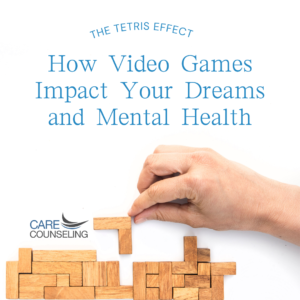How Video Games Can Impact Your Dreams and Mental Health
 Video games have been a source of entertainment and escape for many, offering a world of adventure, challenge, and creativity. But what happens when the gaming experience transcends the screen and infiltrates your dreams and daily life? This phenomenon, known as the “Tetris Effect,” is a fascinating exploration of how video games can influence your subconscious mind, thoughts, and even mental health
Video games have been a source of entertainment and escape for many, offering a world of adventure, challenge, and creativity. But what happens when the gaming experience transcends the screen and infiltrates your dreams and daily life? This phenomenon, known as the “Tetris Effect,” is a fascinating exploration of how video games can influence your subconscious mind, thoughts, and even mental health
- What Is the Tetris Effect?
The Tetris Effect, originally named after the classic puzzle video game “Tetris,” is a psychological phenomenon where repetitive in-game experiences influence your thoughts, mental processes, and even your dreams. When you spend an extended amount of time playing a video game, it can become so ingrained in your mind that you continue to see patterns, shapes, or gameplay elements in your daily life, even when you’re not playing.
In the case of Tetris, players might find themselves mentally rotating real-world objects to fit together like Tetris blocks or envisioning cascading blocks even when they close their eyes. This effect is not exclusive to Tetris but can occur with various video games that involve repetition and pattern recognition.
- The Science Behind the Tetris Effect
The Tetris Effect can be attributed to the brain’s remarkable ability to adapt and process repetitive information efficiently. When you play a video game for an extended period, your brain becomes highly attuned to the specific patterns and tasks required in the game. This cognitive adaptation allows you to play the game more effectively.
However, when you stop playing the game, your brain doesn’t always switch off this heightened pattern recognition. It continues to seek out the familiar patterns and shapes, which can result in the Tetris Effect. Researchers believe that the phenomenon occurs due to the brain’s pursuit of efficient and optimal problem-solving, even in unrelated real-life scenarios.
- Positive Aspects of the Tetris Effect
While the Tetris Effect may seem unusual, it has some positive aspects. It’s a testament to the brain’s remarkable adaptability and plasticity. This adaptability can be harnessed for creative problem-solving, as people may find new ways to approach challenges and think outside the box. It also illustrates the potential benefits of gaming for cognitive development and enhanced spatial skills.
In addition, the Tetris Effect can be a fun and entertaining experience, often leading to discussions and shared stories among gamers. It’s a testament to the immersive power of video games and the sense of accomplishment and engagement they provide.
- Potential Implications for Mental Health
The Tetris Effect, while intriguing, also raises questions about its potential implications for mental health. For most people, experiencing the Tetris Effect occasionally is harmless and can even be enjoyable. However, in some cases, it may become more persistent and interfere with daily life, potentially leading to negative outcomes.
- Obsessive Thoughts: For some individuals, the Tetris Effect may lead to obsessive thoughts and compulsive behaviors related to the game. These obsessive patterns can disrupt daily life, relationships, and work.
- Sleep Disturbances: The Tetris Effect may also influence sleep patterns. Gamers experiencing the effect might find it difficult to disengage from the game, leading to sleep disturbances and insomnia.
- Impact on Concentration: Persistent Tetris Effect experiences may interfere with concentration and focus, making it challenging to complete tasks that require undivided attention.
- Relationship Strain: If the Tetris Effect disrupts daily routines and social interactions, it can strain relationships with family and friends.
- Managing the Tetris Effect
To ensure that the Tetris Effect remains an enjoyable and manageable phenomenon rather than a disruptive force in your life, consider the following strategies:
- Time Management: Set clear boundaries on your gaming time. Schedule regular breaks to rest your mind and prevent the Tetris Effect from becoming overwhelming.
- Mindful Gaming: Be aware of how gaming is impacting your thoughts and dreams. If you notice it becoming disruptive, take a step back from the game and engage in other activities.
- Diverse Interests: Maintain a balance between gaming and other interests and hobbies. Diversifying your activities can reduce the intensity of the Tetris Effect.
- Social Interaction: Engage in social interactions and maintain relationships with family and friends to prevent gaming from taking over your life.
- Seek Help: If the Tetris Effect is causing distress or interfering with daily functioning, consider seeking professional help. Therapists and counselors can provide guidance and support.
The Tetris Effect is a captivating exploration of how video games can influence the human mind, thoughts, and even dreams. By maintaining a healthy balance between gaming and other activities, setting boundaries, and seeking help if needed, individuals can continue to enjoy their gaming experiences without allowing the Tetris Effect to become disruptive or overwhelming.



























